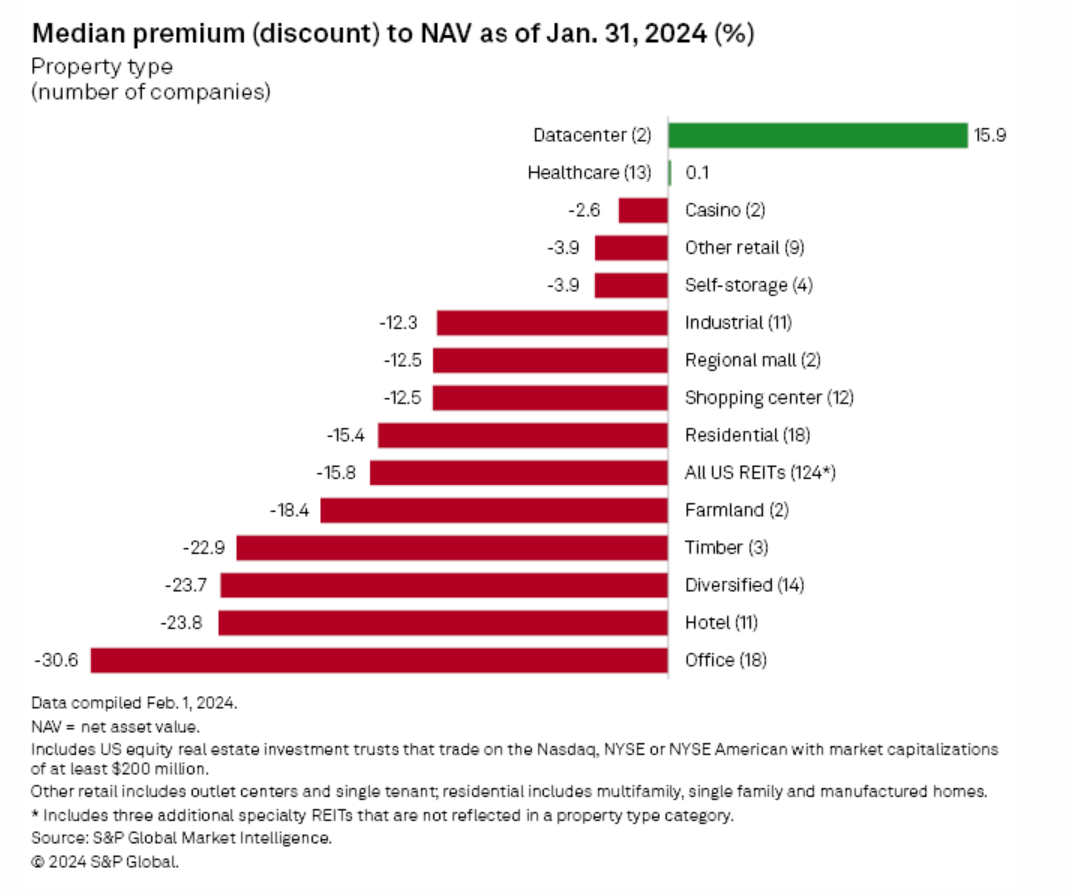REIT Valuations Still Show Discounts
REITs on Sale
Discounts to Net Asset Values
Source: S&P Global
Despite a powerful fourth quarter rally in which REITs outperformed the S&P 500 over 7%, most sub-sectors are still at a meaningful discount to measures of their Net Asset Values (NAVs). According to S&P Global:
"Publicly listed US equity real estate investment trusts traded at a median 15.8% discount to their consensus net asset value (NAV) per share estimates as of Jan. 31, up from a median discount of 10.7% as of Dec. 29, 2023, according to S&P Global Market Intelligence data."
Consensus NAVs are derived by analyst from evaluating a REIT's property portfolio and making estimates of their fair market value. Discounts to NAV arise when the total enterprise value implied by the share price deviates from those estimates. At Armada we believe that REIT prices are more volatile than the fundamentals of the underlying real estate, creating opportunities for public markets investors.
According to research firm Green Street, on average, REITs trade at a slight premium to NAV (chart below). By Green Street's estimate REITs are broadly trading in-line with this average, but as you can see from the above S&P graph, there is significant divergence between asset classes.
This data speaks to the pitfalls of simply weighting REIT exposure by market cap. Data Center and Healthcare REITs, the two sub-sectors trading at the biggest premiums make up nearly 20% of the capitalization weighted index. Meanwhile Hotels, the best performing sub-sector year-to-date hold a weight of less than 4% in the index.
Malls Get a Second (or Third) Life
$800m of Mall Redevelopments at Simon Property Group (SPG)
Malls have been the subject of more premature eulogies than perhaps any other asset class. Mall heavyweight Simon Property Group (SPG) outperformed the REIT index last year by over 17% with a total return of 29.28%.
The strength of retail real estate has been an ascendent theme post-COVID. Now Simon is telling investors that it plans to invest more than $800 million into redevelopment projects to "diversify its retail centers and attract more shoppers." David Simon, Chairman and CEO, told analysts on the fourth quarter earnings call,
"On the property level, there's no question that all of the mixed-use stuff that we're bringing in, plus the redevelopment of our store boxes, are probably the most ... interesting and exciting things that we're doing on the ground."
The redevelopments are comprehensive and designed increase density, adding non-retail components like multi-family developments and hotels. Simon's successful redevelopment of Phipps Plaza in the Buckhead section of Atlanta is serving as a proof of concept. Phipps Plaza now boasts a Nobu hotel and restaurant, a Lifetime fitness center, and a 340,000-square-foot office building on its site.
Simon owns 183 million square feet of leasable retail space. In 2023, they were able to raise their average rent per square foot nearly 15% to $63.14 from $54.92. According to CoStar, "[o]ccupancy at its U.S. malls and premium outlets was 95.8% as of Dec. 31, compared to 94.9% at the end of 2022."
Simon says they will fund their redevelopment activity with internally generated cash flows.
From the Armada Team
Armada CEO, Phil Bak on "The Only Thing that Matters"
Fifteen years ago, venture capitalist Marc Andreessen called product/market fit the only thing that matters for startups. He didn't say that it was the most important thing, he said it was the only thing.
>> SubstackArmada CEO, Phil Bak on "The Only Thing that Matters"
Fifteen years ago, venture capitalist Marc Andreessen called product/market fit the only thing that matters for startups. He didn't say that it was the most important thing, he said it was the only thing.
Hunter Hopcroft, Director of Portfolio Solutions on Financial Abstractions
Most everyday transactions are really financial abstractions. It is not necessary, or even practical, for people to think in these terms. You do not need to run Black-Scholes on your international bar tab. They are useful simplifications that reduce the inherent frictions of global trade.
For financial markets, these transactions are the raw material for instruments that hedge, speculate or leverage capital into more capital. For financial market participants, breaking investment returns down to their component parts and understanding them isn't just an interesting thought exercise -- it's the entire job!






